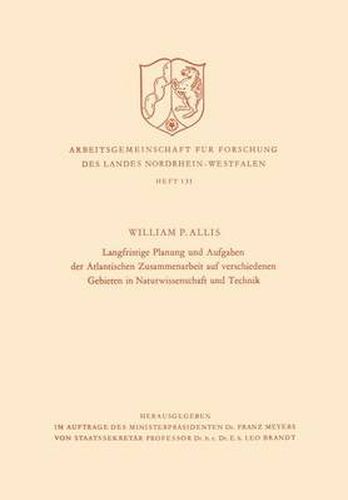Readings Newsletter
Become a Readings Member to make your shopping experience even easier.
Sign in or sign up for free!
You’re not far away from qualifying for FREE standard shipping within Australia
You’ve qualified for FREE standard shipping within Australia
The cart is loading…






This title is printed to order. This book may have been self-published. If so, we cannot guarantee the quality of the content. In the main most books will have gone through the editing process however some may not. We therefore suggest that you be aware of this before ordering this book. If in doubt check either the author or publisher’s details as we are unable to accept any returns unless they are faulty. Please contact us if you have any questions.
Today military potential depends so strongly on scientific and technical capacity that cooperation in these matters within NATO is a necessity. It is equally important that full use is made of our scientific knowledge in reach- ing strategie and political decisions. National policy and science interact in both directions: the rapid development of atomic energy is a consequence of its military usefulness and conversely advances in the biological sciences, such as birth control and the development of mental drugs, may weIl have major impacts on future political situations. NATO has no monopoly on scientific cooperation; UNESCO, OECD, and many specialized agencies such as CERN and ELDO are concerned with it. However, the development of all sciences is necessary if we are to select developments which are of de- fence usefulness. NATO’s scientific programme under the supervision of the Science Committee includes travelling fellowships for 700 students each year, 40 advanced summer institutes, and many research grants. The latter are primarily directed towards collaboration between workers in different NATO countries. An important document prepared by the Killian Working Group pro- poses that an International Institute of Science & Technology, devoted to advanced teaching and research, would be foundedas an independent organi- zation outside of NATO. Such an institute should attract faculty which now often emigrate to the V. S.
$9.00 standard shipping within Australia
FREE standard shipping within Australia for orders over $100.00
Express & International shipping calculated at checkout
This title is printed to order. This book may have been self-published. If so, we cannot guarantee the quality of the content. In the main most books will have gone through the editing process however some may not. We therefore suggest that you be aware of this before ordering this book. If in doubt check either the author or publisher’s details as we are unable to accept any returns unless they are faulty. Please contact us if you have any questions.
Today military potential depends so strongly on scientific and technical capacity that cooperation in these matters within NATO is a necessity. It is equally important that full use is made of our scientific knowledge in reach- ing strategie and political decisions. National policy and science interact in both directions: the rapid development of atomic energy is a consequence of its military usefulness and conversely advances in the biological sciences, such as birth control and the development of mental drugs, may weIl have major impacts on future political situations. NATO has no monopoly on scientific cooperation; UNESCO, OECD, and many specialized agencies such as CERN and ELDO are concerned with it. However, the development of all sciences is necessary if we are to select developments which are of de- fence usefulness. NATO’s scientific programme under the supervision of the Science Committee includes travelling fellowships for 700 students each year, 40 advanced summer institutes, and many research grants. The latter are primarily directed towards collaboration between workers in different NATO countries. An important document prepared by the Killian Working Group pro- poses that an International Institute of Science & Technology, devoted to advanced teaching and research, would be foundedas an independent organi- zation outside of NATO. Such an institute should attract faculty which now often emigrate to the V. S.